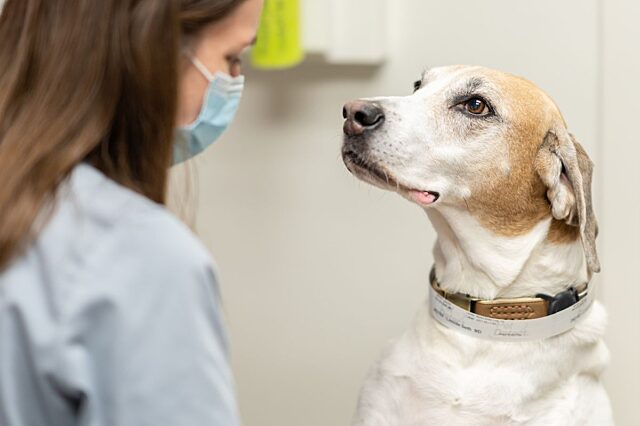New linear accelerator at UF veterinary college enhances cancer treatment for animals

A 9-year-old dog named Lincoln, diagnosed with a tumor deep inside his chest that threatened his heart, is doing well at home in Orlando and back to counter-surfing for treats after completing a month of radiation therapy at UF’s College of Veterinary Medicine, becoming one of the first patients to be treated using a new linear accelerator, or LINAC, now available to animal patients at UF.
The veterinary oncology team at UF began treating cancer patients with the leading-edge technology —on par with equipment used in top human hospitals — in mid-September, soon after the LINAC’s installation was complete. Lincoln’s treatment began its first week in operation.
The UF college is one of only three veterinary colleges in the country to own the technology, which allows the use of highly targeted radiation to deliver more precise and faster treatment of tumors within the abdominal cavity or the chest, where movement occurs due to breathing. The Edge LINAC, manufactured by Varian, was made possible by a $3 million gift from the Gauntt Foundation in 2020.
At the time of Lincoln’s treatment, veterinarians were unsure exactly what type of mass he had, but tumors typically found in the mediastinal area — an important region of the body located between the lungs — are sensitive to radiation therapy, said Keijiro Shiomitsu, D.V.M, an associate professor of radiation oncology with the college.
“Based on that, I was confident that Lincoln’s mass would likely respond well to radiation therapy,” Shiomitsu said. “Actually, at the time of his last treatment on Oct. 15, a cone-beam CT scan revealed that the mass showed shrinkage.”
Lincoln’s owners, physicians Monisha Seth and Anthony Douglas, of Orlando, adopted him in 2014 from a troubled home after a friend suggested their family might be a good fit.
“He’s doing wonderfully,” Seth said. “He’s been wagging his tail and tricking me into giving him treats and wet dog food whenever he wants it.”
Lincoln was always high energy; he jumped over boxes and ran to jump on and play with them when the couple first met him, she said.
“But he is also a hugger and a love sponge,” Seth said, adding that one of Lincoln’s favorite hobbies is snoozing on a chaise lounge by the family pool.
Lincoln’s journey leading up to radiation therapy at UF was complicated. In 2020, the couple noticed a growth on his front leg, which was diagnosed as a soft tissue sarcoma. Because the mass was not in a place where it could be easily removed, veterinarians recommended amputation, but the final pathology report Seth and Douglas received from their veterinarian was ambiguous as to whether all of the cancer had been removed. Lincoln would receive quarterly check-ups, with physical exams and chest X-rays to monitor for recurrence.
At the end of June, when he went for his routine follow-up, he had 2.5 liters of fluid in his chest. Although the fluid was removed and did not have cancer cells, it returned two weeks later.
Preliminary testing suggested that the fluid was lymphatic, and major surgery was recommended. However, a second opinion provided by UF’s Brad Case, D.V.M., a soft tissue surgeon, led to a CT scan that revealed the issue was not a primary lymph problem; rather, it was a mass in an area of his chest known as the mediastinum.
“Lincoln was then transferred to UF’s radiation oncology service for radiation therapy,” said Shiomitsu. “We are hopeful that this treatment will slow down progression of the tumor invasion, as well as provide a good quality of life for as long as possible.”
Seth and Douglas are well familiar with UF, having brought their animals to its Small Animal Hospital for many years.
“One of the many things we love about the UF Small Animal Hospital at UF is that their people collaborate and work together as a team, with the care of your pet as their top priority,” Seth said.
When Seth and Douglas received Shiomitsu’s recommendation to begin the four-week radiation regimen, the LINAC was still being installed, so they had to wait a few weeks to start treatment.
“This was anxiety-provoking, since we knew there was a cancer growing inside of him and fluid on his lungs,” Seth said. “However, we knew the treatment he would get was worth it, and we knew the doctors would tell us if they didn’t think we should wait and should go somewhere else for treatment.”
The couple came to UF on four consecutive Fridays, arriving in the morning and leaving mid-afternoon after Lincoln completed each treatment. These were long days, Seth said, but added that the radiation team took great care of Lincoln, always returning him in great spirits.
As physicians, she said she and Douglas were aware of the new Varian Edge’s capabilities.
“We know exactly how cutting-edge it is,” she said. “It’s more advanced than many human hospitals even have. We are also keenly aware of the difference between quality of life and quantity of life, and since he was always relatively asymptomatic, we didn’t want to subject him to anything with serious or debilitating side effects.”
She added that the Edge LINAC was so accurate that radiation could be administered precisely to the tumor without damaging surrounding tissue.
“Lincoln’s case is a great example of a situation where we are now able to target tumors that we previously would have been unable to deliver radiation to successfully,” said Chris Adin, D.V.M, chair of the college’s department of small animal clinical sciences. “The new Edge LINAC will be a game-changer for us and for all of the animals we will now have the ability to treat that we never could before.”
Media contact: Ken Garcia at kdgarcia@ufl.edu or 352-265-9408
About the author
